Hans Jayanti 2000
Prem Rawat makes many false or meaningless claims in this book.
"My father passed away when I was very young, but my relationship with him never died. It has grown and it is still alive. There are other people in India who had that same connection and they actually received this gift from him. For them, too, that connection is still there. It has never evaporated. Love, truly, can be very, very immortal." - Most of the people who were alive in the last 45 years that had been initiated into the Rawats' Knowledge while Hans Rawat was still alive disowned Prem Rawat as their guru and Master including his mother and elder brothers and all but a handful of the mahatmas and the Divya Sandesh Parishad administrators. After flying to India in 1975 and losing his legal battles there he was unable even to return to India until 1986.
"I have never, in my whole life, seen anyone make an effort like the effort that my father made to let people know about this Knowledge. I would consider myself fortunate if I could manage to come close to emulating his example." - By the time Prem Rawat was born his father was enjoying his wealthy old age with many servants and Prem had a maximum of 4 or 5 years in which he could understand much of anything and he only occasionally accompanied his father on tours. He does not know what effort his father made or what effort many others may have been making. There may well have been hard working mahatmas proselytising without rest and without a car to travel in and nice homes to return to. The other gurus who claimed to be Satguru and authorised by Sri Sarupanand may well have made much more effort.
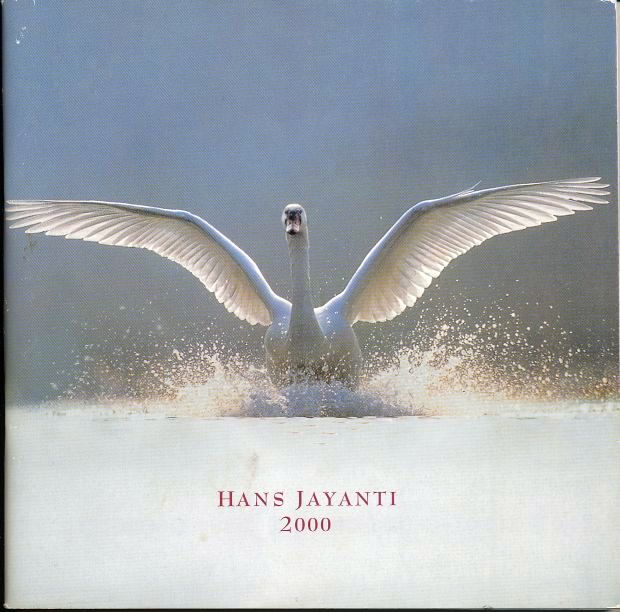

YOGIRAJ PARAM SANT SATGURUDEV
SRI HANS JI MAHARAJ
1900 - 1966

Maharaji at Hans Jayanti 1999
2.
Hans Jayanti 2000 celebrates the life of a remarkable man and teacher.
Yogiraj Param Sant Satgurudev Sri Hans Ji Maharaj was born 100 years ago on 8 November 1900.
He died 66 years later but his legacy lives on today. Since his death in 1966 his life, which was dedicated to offering the people of India a path to inner contentment and truth, has been commemorated with this annual festival.
His son, Maharaji, has carried on his work and has subsequently taken the gift of Knowledge around the world giving it to people in more than 80 countries.
This book contains extracts from speeches Sri Hans Ji Maharaj, gave in the Fifties and Sixties, and a short biography, followed by some of Maharaji's own recollections about his father and master.
3.

4.

The aim of human life
What are the real responsibilities of a human being? I believe that it is necessary for us to think about this. The one definite fact is that we will all die. However, people from all schools of thought believe that the soul or self is immortal, although they do not know this for certain.
The point is that we should recognise that it is only while we are alive that happiness and unhappiness can be experienced…
And what I want to say is that through the kindness of the supreme power we have been given a human life…
You should search, within your hearts… and with thought and understanding discover the purpose of your life… By embracing the teachings of a living master you can experience truth, and by practising Knowledge you can fulfil your lives…
No matter what the world may say about me, I do not oppose any religion or scripture or any particular person. I recommend that everyone experience the divinity within themselves. Those who do not wish to experience that, don't have to. It is no loss to me. After all it is their lives. Those who listen to and understand the master's teachings, participate and experience Knowledge are not obliging me, It is their lives which are fulfilled. It is they who find true happiness and peace.
Shakti Nagar, Delhi, 6 November 1958
These extracts from speeches given by Sri Hans Ji Maharaj in the Fifties and Sixties reflect an era troubled by the global tensions of the Cold War. But they strike a universal and timeless chord: the search for peace, meaning and fulfilment in our lives.
6.



The fragrance of Knowledge
Knowledge, they say, is like the sandalwood tree and the master like the breeze. The entire sandalwood tree is filled with fragrance, but even if it wanted to give its fragrance away, it could not. Yet when the breeze blows, it carries the fragrance to the whole forest.
As a result, other trees become as fragrant as the sandalwood tree.
In the same way, the entire world is fragrant with Knowledge, but without the breeze of the master, no one would experience that joy.
When the master comes, he gives Knowledge, and those who receive it feel the joy of the infinite.
Dankaur, Bulandshahar, Uttar Pradesh
25 December 1959
9.
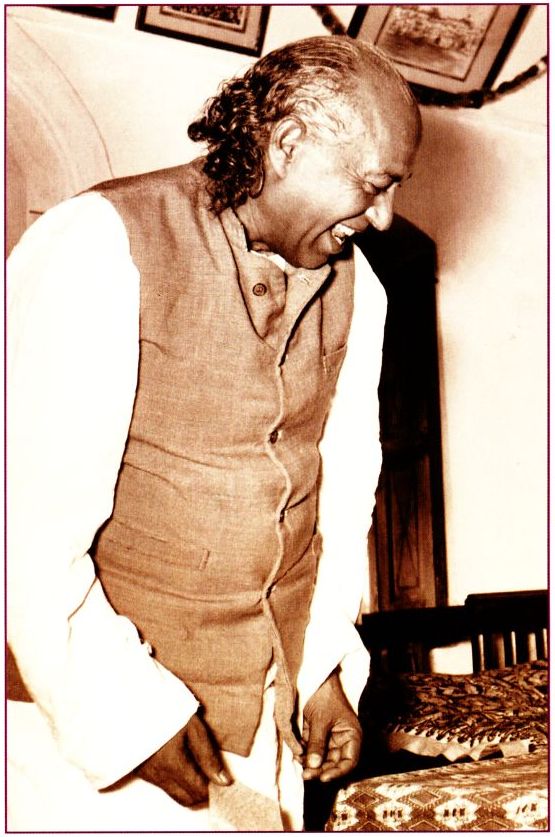
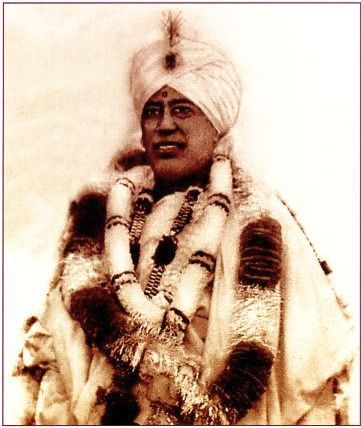
Dreamworld
Just as there is happiness in acquiring wealth, so there is unhappiness when it is lost. The trouble with wealth is that it will not go with you when you die. It will all remain here.
For this reason people liken this world to a dream in the middle of the night. No one properly considers where they have come from nor where they are going. People watch as the world changes before their eyes: they see babies born and they see old people die. Despite witnessing all this, they do not draw the appropriate conclusion: that no one remains here forever.
People do not recognise the truth; they have actually mistaken illusion for truth. While asleep our dreams seem real, but on awakening we realize that they were unreal and merely dreams. In the same way, when the time comes to leave this body, everything we have achieved in our lives will appear as a dream.
No amount of worldly pleasures can fulfil the potential of a human life. That power which has given birth to us all also nurtures us. Human life is a gift. But what is it that will enable us to understand the preciousness of life? The gift of Knowledge can help us attain an immeasurable wealth within us. Nothing in this world can compare to it. And it is only from a living master that we can receive it.
That is why it is said: "There is no greater giver than the master, and no luckier person than his student."
With Knowledge he gives us an infinite wealth. It is immortal, the ultimate truth, perfect in and of itself and it will be with us always.
The person who is truly thirsty for truth will receive this gift.
August 1952, Dehra Dun, Uttar Pradesh
12.

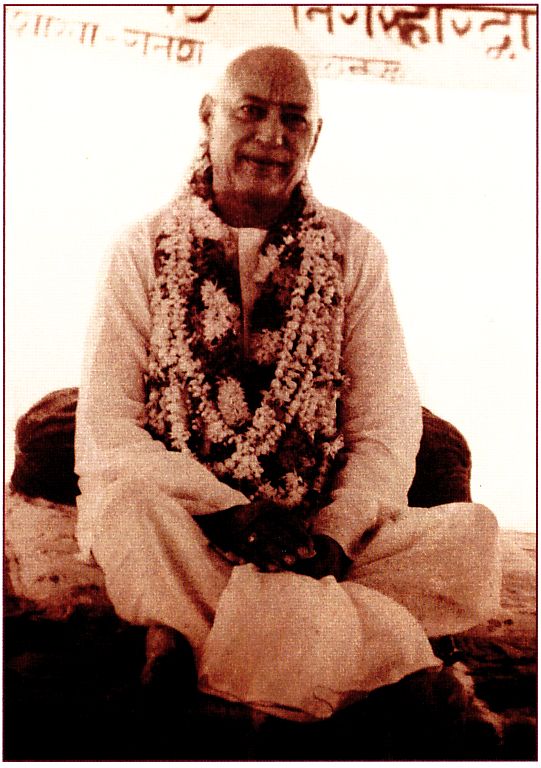
"This body is a hotel. You are just a guest.
One day you will have to leave.
This body is like a clay pot.
One never knows when it will fall and disintegrate."
15.

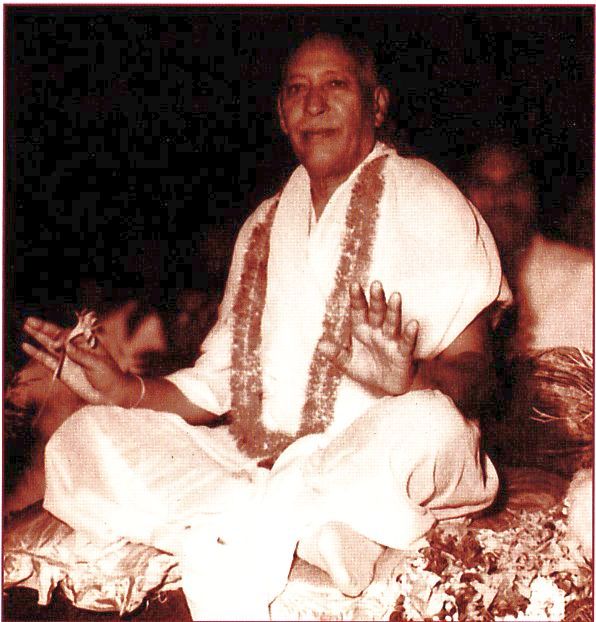

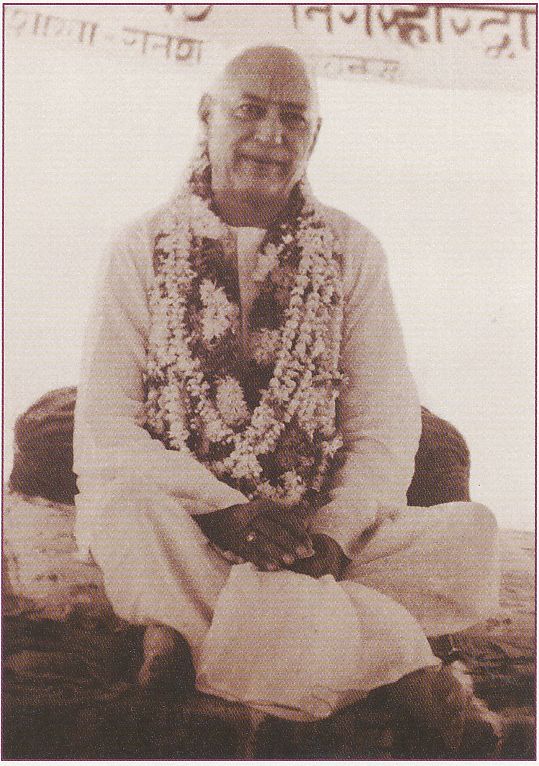
Permanent peace lies within
From birth to death we strive for constant happiness and seek to avoid all troubles and suffering. In most cases we do not succeed Instead we continue to get ourselves tied up in doubt and anxiety. Our happiness is only short lived, and true happiness, like a mirage, remains an illusion. Yet we still continue to pursue it, wherever we think it can be found.
Modern society with all its laws, scientific inventions and discoveries, technological innovations and the conquest of nature, represents mankind's attempts to find happiness. But we can see by looking around us that the actual results are only unrest and unhappiness, anxiety and frustration. Real happiness has not been obtained, peace has not been found, and suffering has not been removed Instead the situation has arisen where the very existence of the human race is threatened Man, who before was so confident, is now bewildered by his own failure. He is now searching for new solutions, not knowing what to do next.
The first step to saving the human race from self-destruction is to find out the cause of this failure. If you think about it, you will see that the main causes are not in the world around but inside our own minds. We suffer from inadequate discrimination and too often mistake the pleasures obtained from the senses for true happiness. This has led to all the troubles that you see in the world, in society and in the individual. Because of this misunderstanding of important yet elementary truths, we try to find happiness and peace in ideas and actions where they can never be found The obvious results are frustration and dissatisfaction. In fact, the more we seek satisfaction where it cannot be found the greater the frustration and dissatisfaction when we finally have to acknowledge our failure.
Permanent peace can never be provided by social, administrative or financial measures, not even in schemes to improve the environment by overcoming such problems as overpopulation or pollution.
Permanent peace lies within and that is the only place where it can be found It is really very strange that in the world today our preoccupation with wealth, power and sensual enjoyments takes
18.
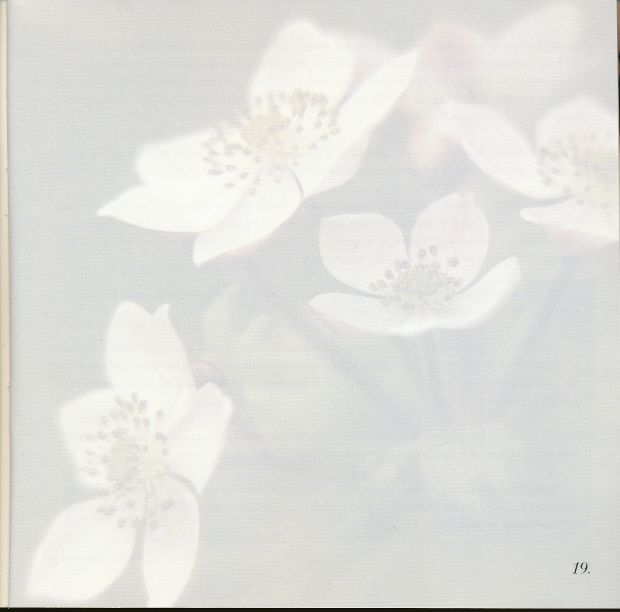
us far from good living and right thinking, yet sermons and lectures are delivered day in, day out on how to improve human behaviour and cultivate fearlessness, love and universal brotherhood Competition for love, power and sensual enjoyments can never harmonise human interests and make us work together with brotherly love. And the diversity of interests which competition leads to can never end competition and conflict.
Dr S. Radha Krishnan, the vice-president of India, has said: "The crisis which is facing us is a human one and what is necessary is an improvement in human behaviour"
But nobody is actually suggesting how human behaviour can be improved Can it be improved by mere lectures? Can it be improved by the laws of the state? Can it be improved by publicity campaigns and advertising? Can it be improved by negotiations around the table? How can it be improved? There appears to be complete ignorance on this subject.
The natural conclusion is that there is no answer in sight to today's human crisis and that tomorrow will bring the annihilation of the human race.
There is only one method to bring about an improvement in human behaviour leading to peace and unity, and that is receiving true Knowledge from a living master. Individual men and women are the primary unit in society and only when peace is obtained by each individual for him or herself will peace prevail in society.
Peace cannot be obtained by an agitated and unsteady mind, and no society can be peaceful and loving unless its individual members become peaceful and loving.
Knowledge gives man a complete understanding of the source of life itself The entire universe emanates from this source of life. By knowing that, happiness is found, and the deathless state of self-realization is attained.
New Delhi, 18 November 1963
20.
SRI HANS JI MAHARAJ,
A MASTER

On the evening of 12 June 1966, as a cool wind blew down from the Himalayas, about 400 people gathered beneath a brightly decorated stage in the centre of the Parade Ground in the centre of Dehra Dun, a small Indian town. Along the perimeter cars honked and trucks clattered, as the town went about its early evening business. But in the calm of the open grounds, the small crowd sat patiently waiting.
An eight-year-old boy in a black suit and tie clambered on to the stage, barely reaching a bulky microphone. Glancing at his father, who smiled at him for a moment, he began to speak in English. People coughed, a child began to cry, but as the clear, young boy's voice echoed through the speakers, the people who had flocked to the two-day event fell silent.
Prem Pal, who his father had nicknamed Sant Ji, or Saint, told the rapt audience: "Many people read scriptures but they do not know their meaning.
"Only a master can show you that. If you know God, you will know everything in life. God is in your heart and you can know him there. If I have made any mistakes in my talk, please excuse me. Not everyone in the crowd, perhaps, understood; but these few wise words from a young boy touched their hearts and enchanted them.
22.
Some years earlier, Sri Hans Ji Maharaj had been asked how a small child could understand his teachings. He responded by saying: "The self is neither small nor big; neither old nor new." Sant Ji was only two years old at the time. But four years later, in January 1964, Sri Maharaj Ji, as he would become known, gave him and his young brothers Knowledge.
As Sant Ji grew older, Sri Maharaj Ji occasionally asked him to speak at his events. At a family picnic in the nearby hill-station of Musoorie, he had asked each of his four sons to say a few words in English and Sant Ji was chosen as the best speaker. "He will continue my work," he said at the time, smiling. But that night in Dehra Dun, under the bright mountain stars, no one knew, perhaps, how soon that would happen.
Five weeks later, in the early hours of 19 July, Yogiraj Param Sant Satgurudev Sri Hans Ji Maharaj left his body. From Delhi, his funeral bier was taken to his home in Dehra Dun, where it was covered in roses and marigolds, and from there back down to Prem Nagar, the haven he had created on the banks of the River Ganges, outside Hardwar. As those of his followers who could reach there crowded the ashram's courtyard and its flat roofs, spilling out into the fields beyond, Sri Maharaj Ji's last rites were performed. But for the sounds of weeping there was silence. Sri Maharaj Ji, the beloved father and
23.
master of his children and the light of so many lives in India, was gone.
On a chilly morning on 8 November 1900, in the village of Gadh-ki-Sedhia, north-east of Hardwar, high in the foothills of the Himalayas, a baby boy was born. His parents, Ranjit Singh Rawat and Kalindi Devi named him Hans Ram. As the baby began playing in the solid stone house in the mountains, his pretty face, broad forehead and constant smile made him the favourite of his family.
Ranjit Singh and Kalindi Devi were a devout couple. While Ranjit, a farmer, was often busy in his fields, Kalindi would visit the village temple daily, taking her baby boy with her. As Hans grew up, his mother's prayers and her devotion to the Hindu gods left a deep and lasting impression on him.
But at the age of eight, not long after he had begun attending the village school, Hans Ji's mother died; and from then he was brought up by his aunt. The loss of his mother at such an early age had a profound effect on the little boy, who became a thoughtful and rather solitary child. Much later in life he was to tell people that during his childhood he had deep inner experiences, which neither his relatives nor teachers were able to explain to him.
As Hans Ji grew to adulthood, he began questioning the meaning of life and the religious practices he saw around him.
24.
 India then, as now, was not short of holy men, living in the mountains near Hans Ji's village and in every pilgrimage town. Hans Ji visited some of them, travelling westwards, in those days before Partition, to what are now the Pakistani provinces of Sind, Baluchistan and Punjab. But he became increasingly disenchanted. He turned instead to the ideas of a popular movement, formed to purify Hinduism of its caste prejudices and idolatry, the Arya Samaj.
India then, as now, was not short of holy men, living in the mountains near Hans Ji's village and in every pilgrimage town. Hans Ji visited some of them, travelling westwards, in those days before Partition, to what are now the Pakistani provinces of Sind, Baluchistan and Punjab. But he became increasingly disenchanted. He turned instead to the ideas of a popular movement, formed to purify Hinduism of its caste prejudices and idolatry, the Arya Samaj.
In the 1920s India was boiling with nationalist fervour. A decade earlier, Mahatma Gandhi had returned from South Africa, revitalising the fusty Congress party. His nation-wide satyagraha – a campaign of civil disobedience against the British – was in full swing. Indians, lead by Gandhi, Jawaharlal Nehru and other Congress leaders, were clamouring for independence. For many, nationalism was equated with Hinduism and organisations like the Arya Samaj became prominent vehicles of expression.
By now Hans Ji needed to find a job. Like many young men he travelled to the nearest large city looking for work, which in his case was the courtly capital of the former Sikh kingdom, Lahore. There, however, Hans Ji was to find far more than a job. In Lahore, he was introduced to Sri Sarupanand Ji, the first teacher out of the many he had met whose words and presence struck a chord in his heart. It was an encounter that would change not only his life, but the lives of thousands of people.
25.
Years later, Sri Maharaj Ji he told a remarkable story about an incident shortly before he received Knowledge. He had gone to bathe in the fast-flowing Ganges when suddenly the current caught him up and swept him away. Despite knowing how to swim, the pull was too strong. Just as he was about to drown, he remembered the master he had met in Lahore. "I remembered hearing that without a master no one can find true freedom; and in those moments, my only thought was: 'You still don't have a master!' Suddenly, the master appeared and pulled me out of the river; but when I looked around for him, afterwards, he wasn't there." Hans Ji decided, once again, to seek out Sri Sarupanand Ji.


Soon after, in 1923, Hans Ji received Knowledge, an experience he later described. "I was given no mantra, but I experienced Knowledge. I experienced the music and light of my heart. My mind was focused within." In the months that followed, he often disappeared for clays at a time to meditate in the high Himalayas beyond his home. Three years later, Sri Sarupanand Ji asked him to begin showing the techniques of Knowledge and, for the next 10 years, Hans Ji travelled throughout what is now Pakistan and north India. He lived simply, often walking long distances to remote, dusty villages, absorbed in serving his master. Sri Sarupanand Ji once said of him: "I am in Hans's heart and Hans is in my heart." A new era was about to begin.
26.
In 1936, Sri Sarupanand Ji, who had been staying in the village of Nangli Sahib, near the north Indian town of Meerut, died. Before his death, the elderly master, who had a large following in central as well as northern India, told Hans Ji that he wanted him to continue his work. He also told his other disciples to follow him. But in the intervening years Hans Ji had married Sinduri Devi, a sweet-natured young woman from a neighbouring village in the Himalayan district of Garhwal, making him, in Indian terms, a "householder", a status many of Sri Sarupanand Ji's renunciate mahatmas found unacceptable.
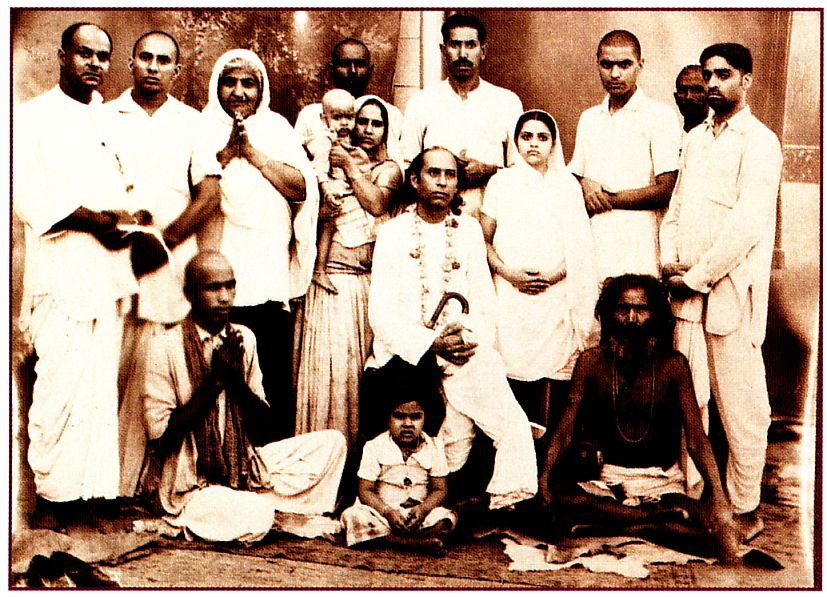
Years later, Sri Maharaj Ji described a true renunciate as "somebody whose consciousness is focused on the reality within". Quoting the poet Kabir, he said: "A thief can change his appearance to look like a saint, but he still won't have what a saint possesses."
In the end, Sri Maharaj Ji was left with only a handful of of people to help him to continue the work. But for the tall young master with intense, glowing eyes, India and her people stretched before him.
Sri Maharaj Ji immediately set to work in the small town of Najibabad, near Hardwar. There, in the bustling lanes and markets and the small factories, he gave his first talks; and influenced not
27.
 only by Knowledge, but also, perhaps by the reformist philosophy of the Arya Samaj, he opened his arms to anyone who came, irrespective of their caste, their religion or their status. It was an unusual attitude for an Indian teacher in those days, and drew its share of critics. That year, 1936, he also published a book, Hans Yog Prakash, as a first step towards broadening his message.
only by Knowledge, but also, perhaps by the reformist philosophy of the Arya Samaj, he opened his arms to anyone who came, irrespective of their caste, their religion or their status. It was an unusual attitude for an Indian teacher in those days, and drew its share of critics. That year, 1936, he also published a book, Hans Yog Prakash, as a first step towards broadening his message.
From Najibabad he travelled to towns and villages across north India, using bullock carts, bicycles, horses – whatever was available. On trains, he travelled in crowded second-class compartments and sometimes he walked, sleeping in the open or on teeming station platforms. Often, he spoke at those stations, creating a pool of calm amid the din of shouting coolies and tea sellers. In villages, he sat on a cot or bench beneath a tree, as people were summoned from surrounding hamlets by conches and bells. With little money to spare, he often survived on gram – dried lentils – and raw sugar, or went hungry. His early simplicity never left him.
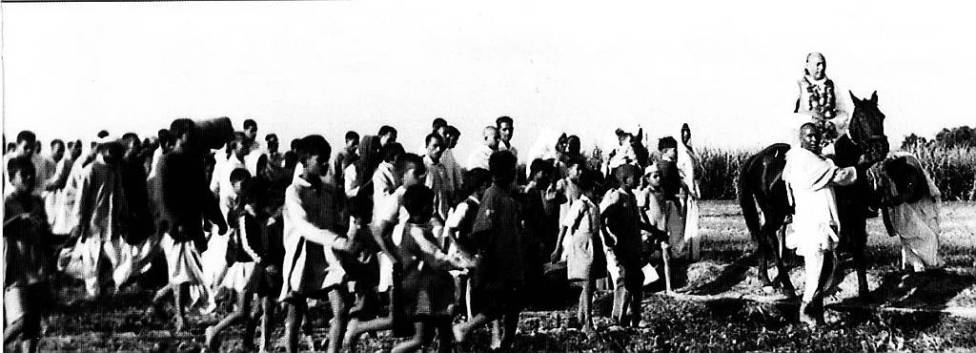

0 seeker of truth, I have witnessed such a great wonder:
A well, suspended in the sky, from which ambrosia ceaselessly flows.
A lame person climbs to it without any ladder and drinks jugs of that nectar.
Gongs, conches and kettle drums ring out without being played by anyone.
The deaf hear them and become ecstatic: they lose track of body and mind.
Up there is a palace without foundation, which is radiant with light.
The blind see it and are so overjoyed they can't stop talking about it.
In that place a person dies, yet continues to live, and has strength without eating food.
Brahmanand says that only a rare soul can understand his tale.
By the late 1930s, Sri Maharaj Ji had begun visiting Delhi, India's capital. New Delhi, the architect Sir Edwin Lutyens's grand monument to the Raj, was still under construction; and outside the old city walls herds of nilgai deer, boar and even an occasional panther roamed the forests. Sri Maharaj Ji began teaching workers at the Delhi Cloth Mills, one of the few industries in Old Delhi, staying in a small room near the mills in the suburb of Karol Bagh. At first the poor labourers, who had little time for meditation, questioned how they could practise, but Sri Maharaj Ji dispelled their worries. As his message spread, he began holding open-air talks by the banks of the Jumna; in those days, a wide muddy river, with minnows in its shallows.

From Karol Bagh, Sri Maharaj Ji, who was still travelling from Hardwar to Delhi, began staying with various followers. First he stayed in a house owned by Rai Bahadur Gaya Prasad, who lived behind New Delhi's centre, Connaught Place, where the first Guru Puja festival was held. Later he moved to another follower's house in Paharganj: at that time, a village beyond the walls of the old city.
31.
Meetings in those days were small, consisting sometimes of no more than 20 or 30 people. Sri Maharaj Ji knew each of his followers well. And they supported his work financially according to Indian custom. He played with them, took care of them and when they were in need gave them money. One young man, who worked in his uncle's photographic shop in Karol Bagh, remembers the time his relatives forced him to choose between working for the family or Sri Maharaj Ji. He chose his master and the next day, having lost his job, he visited Sri Maharaj Ji. "He called me into his room and closed the door. From under a pillow he took a 100 rupee note – a lot of money then – and gave it to me.' He used that money to buy his own shop, a tiny booth in what is now a crowded city street, which Sri Maharaj Ji then inaugurated for him.
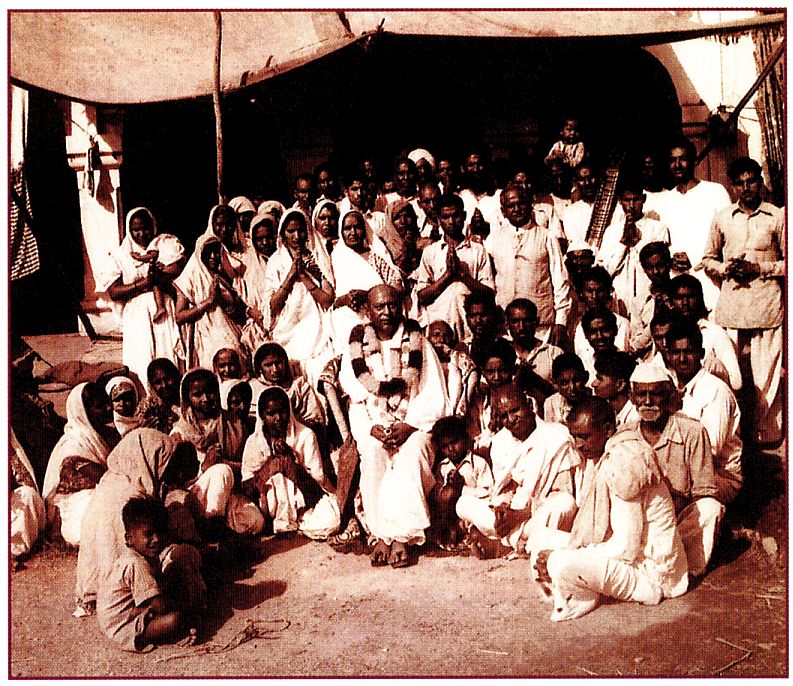
Sri Maharaj Ji also helped another of his students start up in life, paying for him to go to college He also gave Om Prakash, a photographer who travelled with him in the early years, his first camera and 200 rupees to start his own business. "Sri Maharaj Ji was very gentle in all ways. He loved children and at large functions he'd call the children, garland them and give them Indian sweets," remembers Om Prakash. "He also loved elderly people and would ask people to arrange special programmes for them so they didn't have to travel."
32.
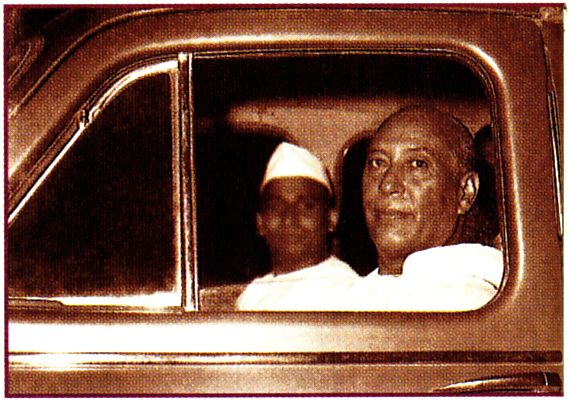 In 1944, Sri Maharaj Ji took an important step. He bought a property with a tiny, two-storey house on the banks of the Ganges canal, outside Hardwar, and named it Prem Nagar, or Town of Love – his first ashram. Sri Maharaj Ji now had a place where mahatmas, who helped full-time with his work, could live. There, with his followers, he could celebrate the festival of colours, Holi, and the other traditional events of the year: the spring festival of Baisakhi and Guru Puja in the summer.
In 1944, Sri Maharaj Ji took an important step. He bought a property with a tiny, two-storey house on the banks of the Ganges canal, outside Hardwar, and named it Prem Nagar, or Town of Love – his first ashram. Sri Maharaj Ji now had a place where mahatmas, who helped full-time with his work, could live. There, with his followers, he could celebrate the festival of colours, Holi, and the other traditional events of the year: the spring festival of Baisakhi and Guru Puja in the summer.
"He used to say that a master's students should see him daily and, if not daily, then every week, every month, or at least once a year," says Uday Anand, who has been documenting Sri Maharaj Ji's life. "So, he made a place where this could happen. Four years later, he also bought his first car, a green Austin Somerset with the registration number DLC 4042. He now had the means to spread Knowledge faster and farther.

The late 1940s and early 1950s were also times of great change in Sri Maharaj Ji's personal life. Years earlier, Sri Sarupanand Ji had told him that he would one day have a son who would play an important role. Sri Maharaj Ji already had a daughter, Savithri, but his wife was unable to have more children.
33.
So, in 1946 he remarried, choosing Rajeshwari Devi, a young woman from Melgaon, a village near his own in the district of Garhwal. Two years later, he bought his own house, in Hardwar. In 1951, his eldest son was born, followed by two more boys, in 1953 and 1955. Finally, in 1957, his youngest son was born. He was to occupy a special place in his father's heart.
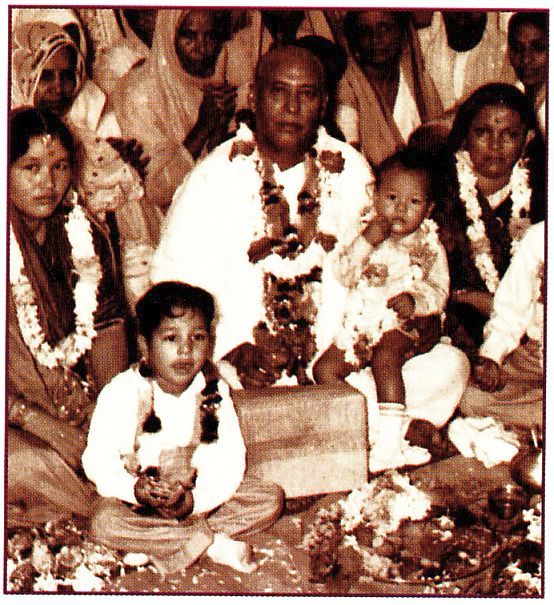
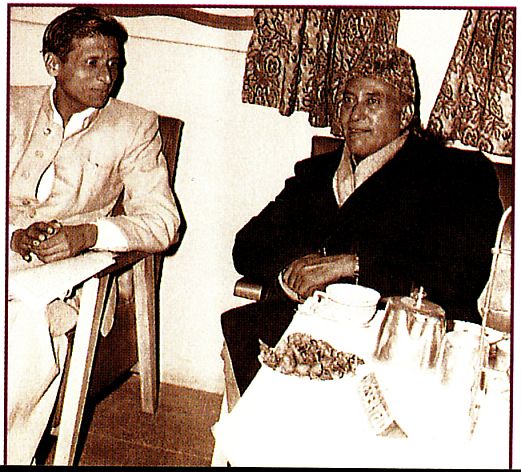
Meanwhile, Sri Maharaj Ji's message was spreading throughout north India. In 1951, Hansadesh, a monthly magazine, had been started; and in 1960, to keep pace with the flow of work, a house and an office were found for him at 29/96 and 19/3 Shakti Nagar, an area of Old Delhi. That year, Sri Maharaj Ji's work also gained an official seal, with the registration of Divine Light Mission as an organisation. By now there were followers in most large cities, and many towns and villages in the states of Uttar Pradesh, Bihar, Haryana, Punjab and Rajasthan, where there was now a small ashram in Alwar. Nonetheless, meetings were still very small and Sri Maharaj Ji's close relationships with his followers continued. "Sri Maharaj Ji had personal relationships with a lot of people," remembers his third son Raja Ji. "It was more like a big family."
Often, Sri Maharaj Ji would arrive unannounced at the house of a follower. "One night, the doorbell at my house in Lucknow, it kept ringing. I was a bit irritated," remembers
34.
V.N. Khare, who received Knowledge in the late 1950s. "When I opened the door, Sri Maharaj Ji was standing there. I was flabbergasted."
The Khare family had played Holi during the celebrations a few days earlier, but Sri Maharaj Ji invited them to play again with him. "He stood on a wooden cot on the roof of my house. Everyone came and threw dry colours over him. Our neighbours were surprised we were playing Holi that day, but they said: 'Your Holi was really special'." Sri Maharaj Ji visited the Khare household unannounced several times after that, sleeping on a simple string bed and eating whatever the family had to offer. "Often, we'd try to arrange a taxi for him to go to meetings," said Mr Khare. "But he'd usually refuse, saying he'd take a rickshaw."
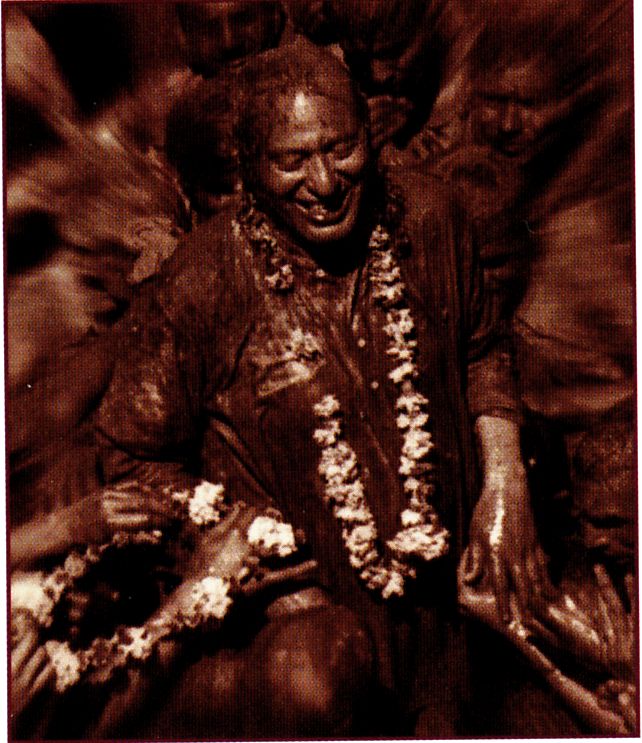
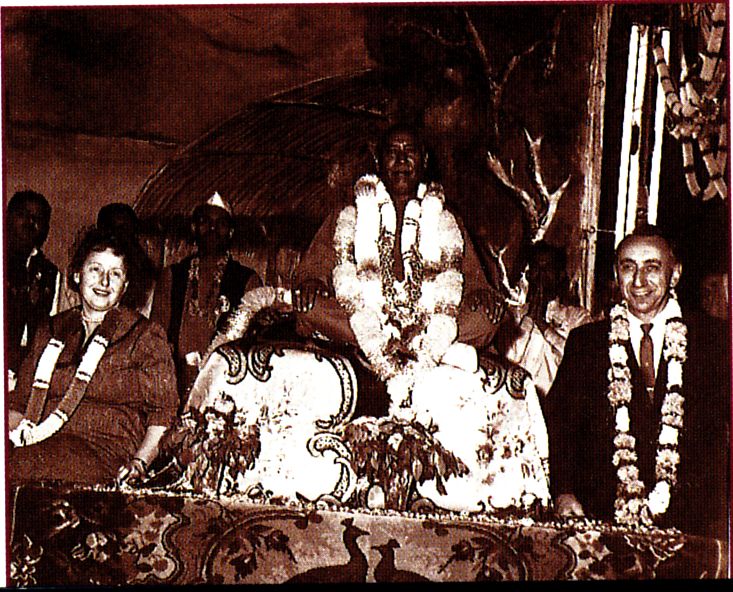
By the early 1960s, however, Sri Maharaj Ji's message had spread overseas to Indians in South Africa. Then in 1963 he held his first large public programme. Some 15,000 people attended this event in the Ram Lila grounds, a huge open space between Old and New Delhi. Among them, seated on the stage below Sri Maharaj Ji, were an American methodist minister and his wife, who had become fascinated by Sri Maharaj Ji. That year, a second ashram called Satlok, meaning Place of Truth, was bought, situated between Delhi and Hardwar.
35.
The following year, Sri Maharaj Ji held an even bigger event in Gandhi Maidan, in the heart of Old Delhi, attended by what seemed like most of the people in the crowded old city. Around that time, Sri Maharaj Ji also attended a religious conference in New Delhi's Constitution Club, opened by the Speaker of India's parliament, Mr Ayengar; and he took his first flight from Jammu, in Kashmir, where many people had received Knowledge.
"Sri Maharaj Ji was a very powerful and attractive person," remembers Om Prakash's wife, Swara, who met him many times but never received Knowledge. "He was very tall, handsome, with large sparkling eyes and a shining face. He'd come down from the stage looking so elegant." Dressed in simple white khurtas and pyjamas or dhotis in the summer, and often wearing an astrakhan cap and an elegant wool Sherwani coat in winter, many people remarked on his resemblance to India's first Prime Minister, Jawaharlal Nehru.

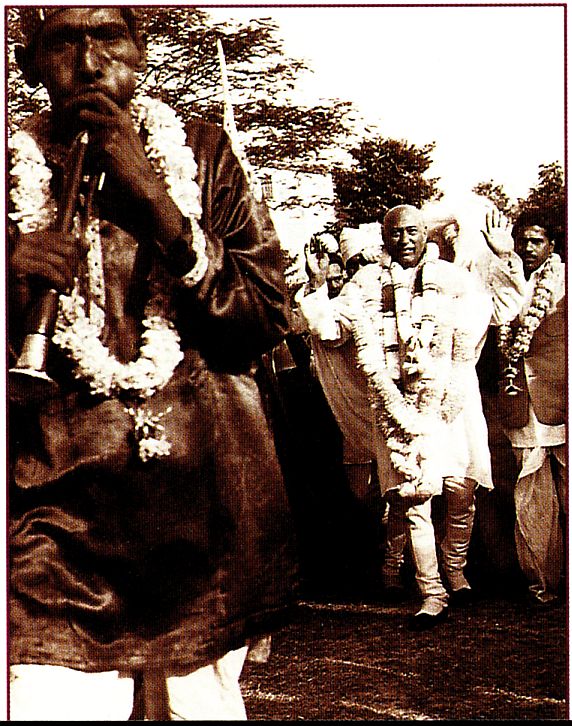
As Sri Maharaj Ji grew older he became increasingly ecstatic and, in the final years of his life, he seemed to be in a state of divine intoxication: constantly laughing and dancing, to the delight of his followers. "He would put his walking stick on his shoulder, as if carrying a corpse, and dance, said Jamuna Devi, who
36.
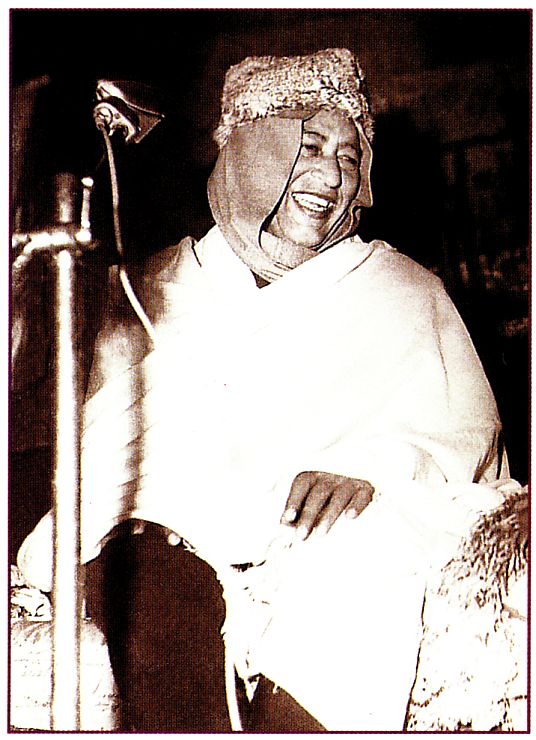 received Knowledge in 1954. "He'd say: 'This world is like a two-day festival… When you die, nobody will go with you.' We understood this to mean that the end of his life was near." And so it was.
received Knowledge in 1954. "He'd say: 'This world is like a two-day festival… When you die, nobody will go with you.' We understood this to mean that the end of his life was near." And so it was.
On 18 July 1966, while visiting the small ashram in Alwar, Sri Maharaj Ji fell ill. That day he returned to Delhi. At 3.00 am the following morning, seated in meditation in a room at Shakti Nagar, he left his body. Three days later, Sri Maharaj Ji's ashes were taken in a procession, led by his family and many grieving mahatmas, to his home in Hardwar. There they were immersed in India's most sacred river, the Ganges. Eventually, they would merge with the ocean.
Thirteen days after Sri Maharaj Ji left his body – at an event to mark the end of mourning – his youngest son, Sant Ji, addressed thousands of weeping followers. "Guru Maharaj Ji is here and will remain here," he said. "He never went away. He is with us. He is within your hearts. If you want, tonight I will show you."

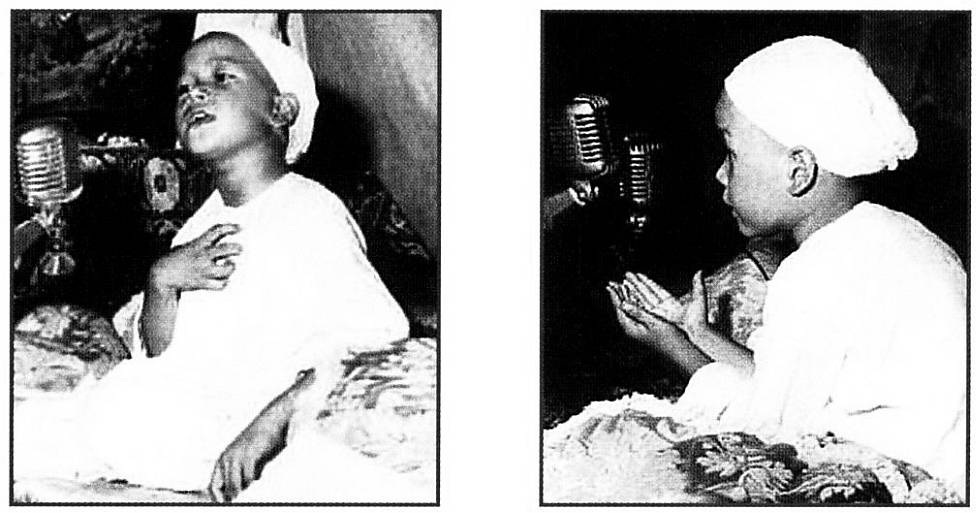
MY FATHER'S QUEST
When he was a young man, my father set out to search for truth. This was in India, a long time ago. Many people then, were offering "Truth". They would hold up something labelled "Truth" and they would say: "Here. Do you want Truth? This is Truth! Don't listen to anybody else." My father would say, "OK," and he would try it. Then, after a while, he would say, "No, this is not the Truth," and he would go on searching.
He was listening to an inner call. To follow it, he was willing to give up all that he had. He didn't want a comfortable life, he just wanted to understand something else, something deep, something completely true.
So he started travelling. In the end, he found what he was looking for. Yet what he finally found didn't have a label on it saying: "The Truth. This is really what you are looking for "
He just recognised it. He recognised a gentleness, a kindness, an understanding from his teacher. And then, when his teacher passed away, he carried this teaching on.
Many times he would say: "I never understood how, without answering those questions that I had, my master answered all the questions that I hadn't even asked."
Pasadena, California, USA, 8 November 1991
Alexandria, Virginia, USA, 18 June 2000
When talking about Knowledge, Maharaji often mentions his father.
These excerpts have been edited from addresses given over the past ten years.
38.

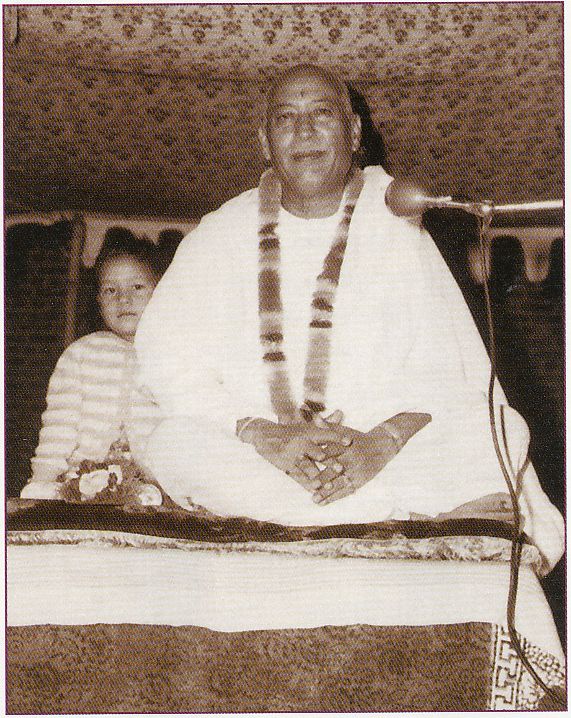
THE LANGUAGE OF LOVE
"I have a funny relationship, a very funny relationship, with my father.
Of course he was my father. That's a wonderful thing. But he was also the one who gave me this precious gift. He is not there anymore. He is not being my physical father anymore. But the gift that he gave me has created a bond between us. It has given us a relationship that transcends everything. In the light of this relationship, nothing else matters. Not even the fact that he is – or was – my father.
The gift that he has given me is allowing me to prosper, within, today.
Thanks to that gift, I'm still growing inside. I'm ageless. Because of it, I have found in the truest sense of the word my immortality. It will never end.
My father taught me a language. A language that allowed me to understand the words that were coming from within myself. When I first heard them, it was (and still is and it will always be) like hearing the most incredible, sweet poetry that anybody could ever write. I carry that within me now, wherever I go.
Brighton, UK, 7 June 1992
41.

42.
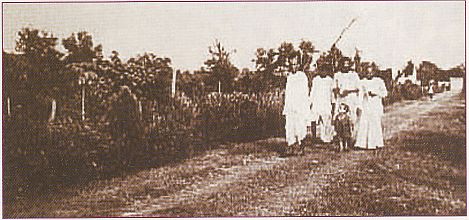
43.
MY LESSON IN PERSISTENCE
There were times when my father went out to speak about Knowledge and people didn't show up to hear him. I know that once he spoke every day for a week in Bombay, at Chopati. The events were not full. People would come, wander in and go again. It was noisy, terrible, not many people wanted to listen. But a few people received Knowledge at that time. That made everything right.
Another time, there was a person who used to work in the Delhi Cloth Mill and he invited my father to come and speak there. I think five or ten people came and heard him. Out of that five or ten people, one person received Knowledge.
The going was not easy. It was tough.
There was no support system, no infrastructure.
But he persevered and he never got disappointed. Never.
Grande Baie, Mauritius, 1 September 1996
44.

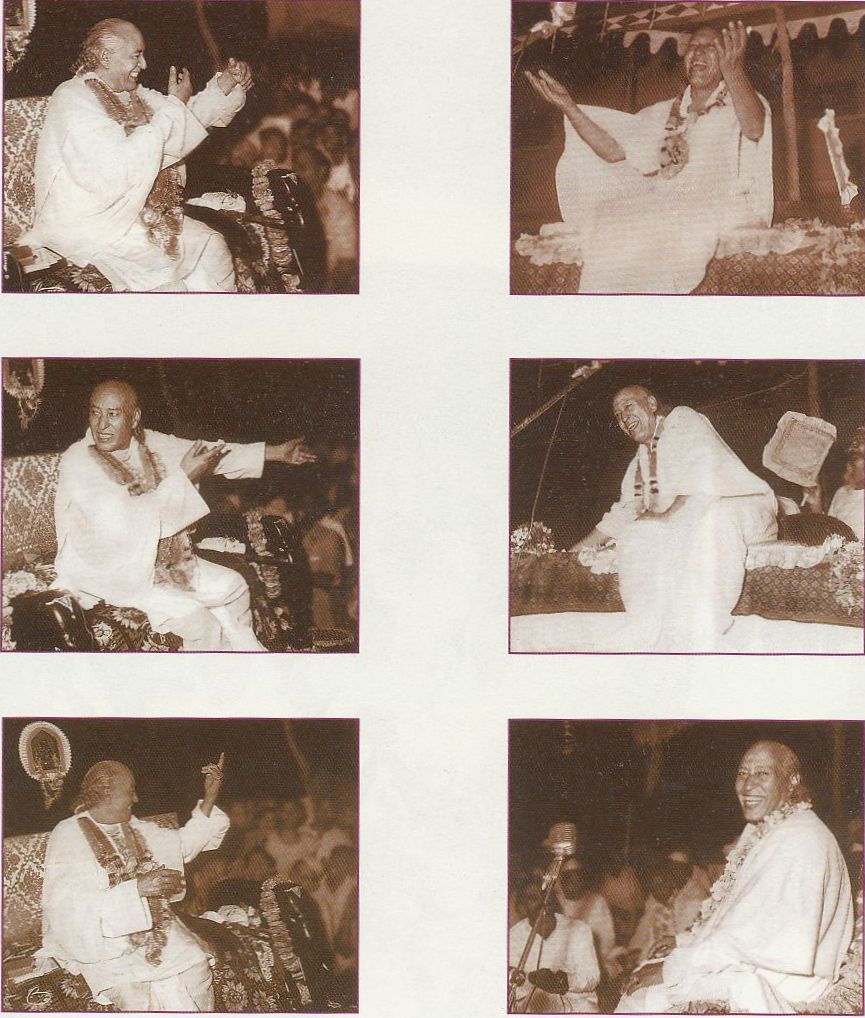
46.
THE GIFT HE GAVE ME
When I was a little kid, I would sit down and listen to my father speak. It was amazing. I would sit there and listen and listen. I couldn't think. There was nothing to think about. There was absolutely nothing to think about. All I had to do was just let go and enjoy myself because what was being said was soothing and nurturing from some place deep, deep, deep down inside.
That's what really counts because that is where the treasure lies. That is what all of us who have Knowledge have found. Through that association, through that experience, we have found a whole other realm in this life.
One time, my father took me with him on a speaking tour. I heard him speak about these magnificent feelings, about how there was something higher than everything else. There was a Knowledge that was better than all knowledges put together. It was the ultimate thing. I wanted that ultimate thing, that really beautiful thing. I can't say I ever went up to him and expressed my desire to have it. But, one day, by a lot of grace, he revealed this Knowledge to me.
It was as if a seed was planted within me on that day. I am eternally thankful for it. Whenever I become exhausted, whenever I become tired, when everywhere I look, I see a flat desert, all I want is a tiny little spot of shade to sit under and catch my breath. Whenever I feel that way, I can sit under a tree. A tree of experience that has grown from the seed that was planted within me on the day I received this Knowledge. I am then so thankful that my father did plant that little seed within me because here is the shade. It's got sweet fruit.
In such a cool shade, what can you say but "thank you"? Thank you to whoever had the perseverance to say to you: "Keep watering this seed. You're going to need it."
In my life, I am so fortunate. I do not take it for granted. I know that I have magic in my life. It's a real magic, a simple magic. A magic that allows my heart to express itself A magic that allows me to express my gratitude to the person who gave me this key. The relationship between my heart and my teacher, the person who revealed this Knowledge to me, is so beautiful. It is so incredible.
Denver, USA, 3 March 1991. Brisbane, Australia, 28 April 1990
Pasadena, California, USA, 8 November 1991
47.

48.

48.
MY FATHER'S LEGACY
My father passed away when I was very young, but my relationship with him never died. It has grown and it is still alive. There are other people in India who had that same connection and they actually received this gift from him. For them, too, that connection is still there. It has never evaporated. Love, truly, can be very, very immortal.
I have never, in my whole life, seen anyone make an effort like the effort that my father made to let people know about this Knowledge. I would consider myself fortunate if I could manage to come close to emulating his example.
Pasadena, California, USA, 8 November 1991
Atlanta, Georgia, USA, 24 July 2000
50.

51.

52.
MY FATHER'S FAVOURITE SONG
My father had a favourite song. He used to play it again and again especially in the later years just before he passed away.
The song said that "This world is only a festival of two days. After that, it will all be lifted up and taken away."
It went on to say: "Your eldest son will only go with you as far as the graveyard and that's it. Your wife will only accompany you as far as the door and what you will leave behind is your mansion, your wealth and everything else."
I remember watching him and seeing him really enjoying this song. Some people would hear something like this and say: "That's such a sad song." Yet he understood it well.
The song said: "The only thing you will take with you is that treasure inside. That swan inside, that 'Hans' inside, that perfect spark of the eternal that shines in the very heart of your being. THAT is the only thing that's going to go with you. Deep within you, there is a cup.
That cup will go with you whether it is full or it is empty. It came with you and it will go with you. If you have managed to fill it, you will go a long way. If it is empty, so shall it remain."
My father loved this song. Every word of it. It made him smile. Even when his health wasn't good, he wouldn't just laugh when he heard it. He would get up and dance to it – and act it out. How profound. He knew.
Through that song, he could teach everyone to gather the joy in their lives now. Gather that strength, gather that precious thing. He could remind them to look inside and fill that cup.
My father also had a favourite couplet that he would often recite. It used to make him weep when he said it out loud. It went like this.
"I was being swept away in this river of darkness. The darkness of this world, of this society. And then my master handed me a lamp. The darkness abated; he pulled me out.
He showed me this beautiful place inside of me. And I am now content."
Pasadena, California, USA, 8 November 1991
Alexandria, Virginia, USA, 18 June 2000
53.
This world is only a festival of two days
It will not last forever.
Of what use are the magnificent palaces you build?
Why do you want to amass a fortune?
Of what use will your elephants and chariots be?
You were born with nothing and you will leave with nothing.
You will end your journey carried in a coffin.
This world is only a festival of two days.
It will not last forever.
You imagine that your wealth will benefit you.
But tell me, who has ever really been helped by money?
The saints have always cautioned that you cannot take it with you.
Only that perfect spark of the eternal will remain.
And all your wealth will be left behind.
You will not be able to take a single penny with you.
This world is only a festival of two days.
It will not last forever.
Your friends will only stay until you have breathed your last.
Your wife will only go to the threshold with you.
And your family will leave you at the cemetery,
Your eldest son will perform your last rites and that is it.
After this your only companion is that treasure inside,
The pure swan of soul.
This world is only a festival of two days.
It will not last forever.

AN EXPERIENCE SO SIMPLE,
SO TRUE, SO BEAUTIFUL
Who can take away the joy of that person who has the beautiful gift of Knowledge?
Who can take away the joy of that person who practises, listens to the master, and understands?
Nobody. No thief can steal it.
No knife can cut it.
So simple, so true, and so beautiful is this experience.
Paris, 25 September 2000
56.

57.

58.
Somebody once asked my father: "What is samadhi?"
Samadhi is supposed to be the ultimate state of enlightenment.
And Sri Maharaji said: "It is the state where you are asleep, but totally awake."
When I heard that, I thought: "It is said that it takes years to get to that state of samadhi. You have to renounce everything and live a certain lifestyle."
This is how it used to be, but now here is Knowledge.
I have seen people enjoy this state in a Knowledge session.
Not everybody, but I've seen it happen in half an hour flat. No, not a lifetime later, but half an hour later.
Knowledge points to one thing: that this breath is a gift.
The master points to one thing: that this life is a gift.
Accept. Enjoy.
Paris, 25 September 2000
59.

